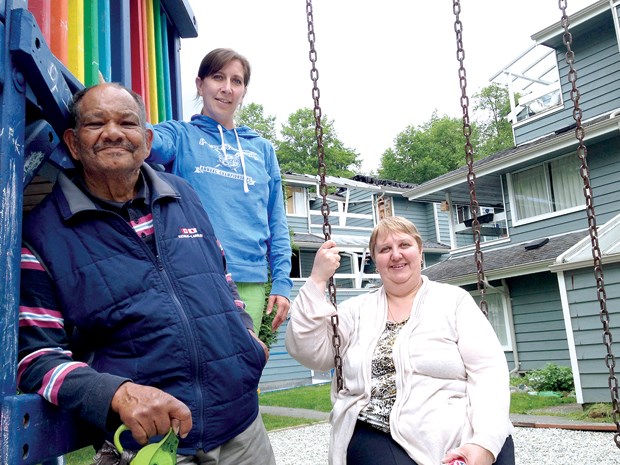The River Woods Co-op has started a crowdfunding campaign to help those residents who are struggling financially because of the fire. Donations can be made at fundaid.ca/riverwoods.
On the night of May 7, Clarke Gonzalez stood on the lawn of River Woods Co-op with her husband and two young children and watched as flames destroyed nearly everything they owned.
“You’re so overwhelmed,” she says of how their lives have been turned upside down ever since the fire gutted one of the four buildings in the Deep Cove compound, forcing 26 families out of their homes. “For the first week, you’re in shock. You can’t eat, you’re not sleeping. The second week it’s ‘Oh my God, I have to find a place to live.’ You’re stressed out and not thinking straight. You make decisions based on how you feel at the time. Your back is against the wall.”
Their first priority was to minimize the trauma for their children, aged eight and five, and that meant maintaining as many routines as possible. River Woods is a safe, nurturing place for children who are accustomed to walking home after school, dropping off their knapsacks and saying, “Mom, I’m going outside.” It was important to find temporary accommodation near their kids’ friends and school.
But while River Woods provides affordable housing — the monthly fee for their three-bedroom unit was $1,130 — the rest of North Vancouver is not as accommodating. After 10 days in a hotel, they found a furnished apartment on West 14th for $3,470 above the $1,130 they continue to contribute. They balked at the price but were told “You have to make a decision by three o’clock today or we’re giving it to someone else.”
In normal circumstances, they’d have more time to find a place and they wouldn’t need it to be furnished. However, nothing after a fire is normal. And it’s this ‘new normal’ that many people don’t think about when they’re buying insurance.
All co-op tenants are required to get contents and liability insurance but how much they get is up to the individual. While co-op president Diane Bennett deals with the insurance for the building — which may not be inhabitable for another 12 to 16 months — she’s also seeing the fall-out of what happens when people underestimate how much insurance they need.
She’s deeply worried about some of the residents’ ability to cope with the unforeseen costs.
Please donate now
What people don’t realize, she says, is how expensive life in limbo is. Not only are rents higher, but you also have to pay for having all of your possessions removed and stored by a restoration company which analyzes — for a fee — what’s salvageable and cleans what can be saved. (Gonzalez’s family tried to do as much of the cleaning as possible to cut down on costs.) This process can take months and end up eating into a lot of your insurance money.
Furnished accommodations tend to be geared towards companies that need short-term space for executives.
So while at first it may seem like fire victims get to live the fine life in hotels and expensive apartments, that bubble will quickly burst.
“How long will you be in the nice home before you’re living on the streets or in your car,” Bennett asks, noting that one resident almost had to resort to living in his car because his insurance company wouldn’t provide immediate funds. “There are limits on your insurance and when you hit your limit, they say, ‘That’s all we can do.’”
Alex Davids counted all the LED lights in the one-bedroom furnished apartment that he and his wife Sherri are now living in for $135 a day. Sixty. He scoffs at all the special features but it’s not like they had many options, especially since they have a dog.
“Suddenly you are homeless,” he says. “You watch those guys living on the street and say, ‘I’m there.’”
Davids is 78 and is obviously having a tough time coping with all the fine print of his insurance policy. Like most seniors in the building, he and his wife are on a fixed income that doesn’t have much wiggle room. If it wasn’t for their sons, they’d be lost.
As it is, the stress and anxiety over money, coupled with their age, make it harder to cope with all the things they have to do, such as find a less expensive place to live.
“Insurance is something you don’t think about. Insurance companies should know that when this happens, people are in shock. Don’t let them guess what happens next,” he says, still frustrated by the lack of guidance they’re receiving.
Bennett says many people look around their apartment and think, “None of this is worth very much” and go for $30,000 in contents and additional living expenses insurance. They don’t factor in the rent differential, the cleaning and storage of their possessions, and the fact they may be homeless for a year during renovations.
Gonzalez recommends that people living on the North Shore have at least $75,000 in insurance for additional living expenses. A lot of their insurance money will go towards the rent of the furnished house they’re moving into at the end of the month. It’s only a few blocks away from River Woods but it comes at a cost — $6,000 a month. Their three-bedroom unit at the co-op was one of the most badly damaged so if they have to live in their new place for a year, that will eat up $58,440 from their available insurance funds.
Bennett’s hard-earned advice is for everyone who rents or owns: “Sit down with a good insurance broker and go over all the possibilities.”



